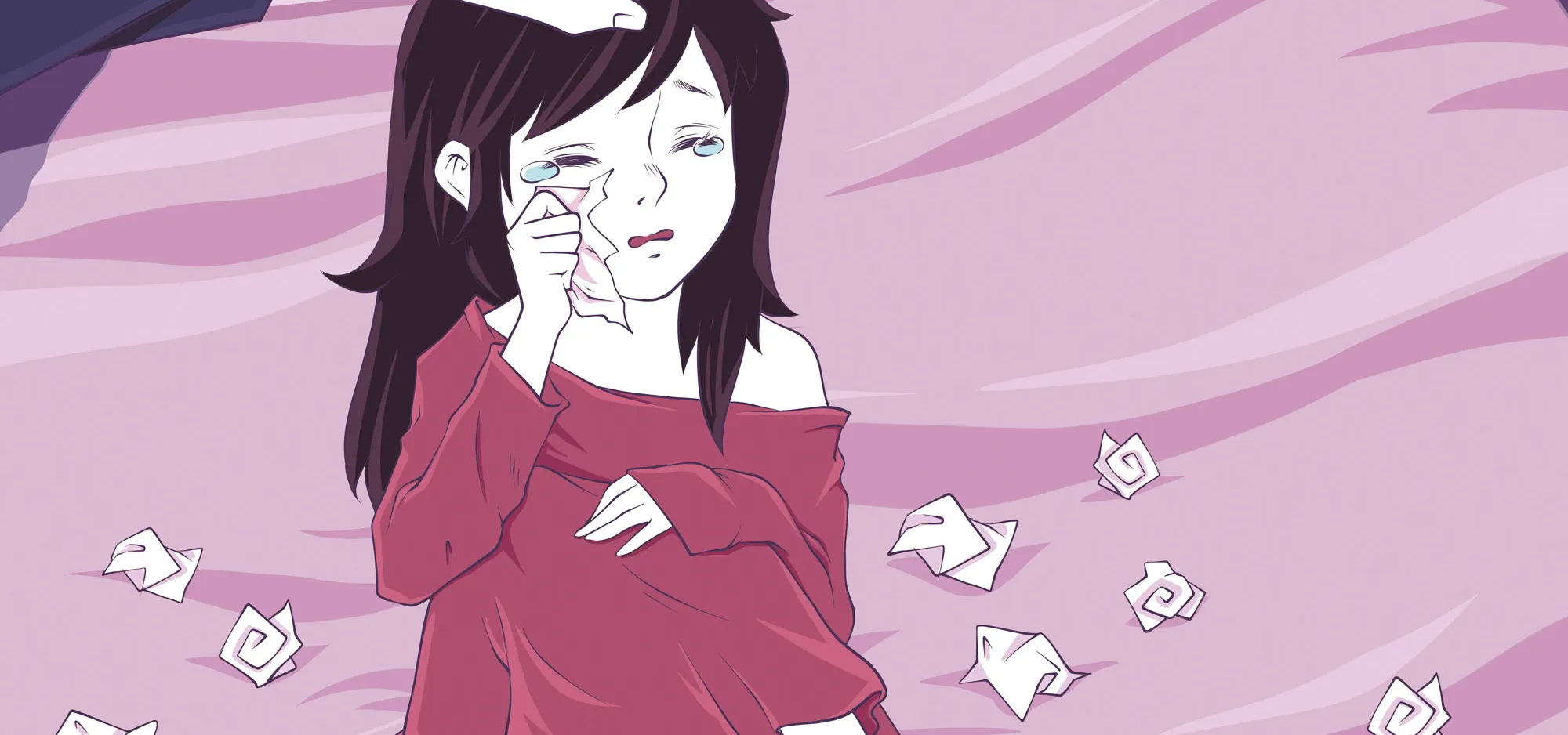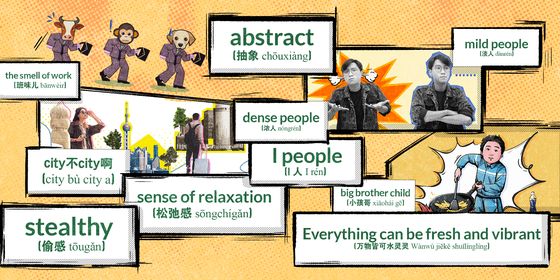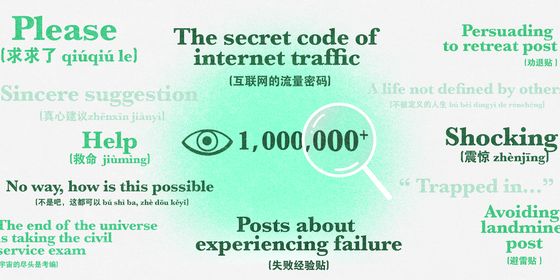How to provide solace amid misery
A pessimistic Chinese saying goes, “Eight or nine out of ten things in life are not as you wish.” (人生不如意之事十之八九。Rénshēng bùrúyì zhī shì shí zhī bā jiǔ.) Yes, existence may be little more than a trudge from chore to chore, broken only by flashes of joy or tragedy, so the least you can do is help out a friend in need. The fact is, however, that comforting someone is a strange business, language-wise. In English, it’s common to say, “there, there”, but where is the “there” to which the first “there” is referring? It’s madness. For the art of comforting in Chinese, always apply the right strategy, or, as another saying goes, “Apply medicine according to the symptoms (对症下药 duì zhèng xià yào).”
First of all, you should learn the phrase 想开点儿 (xiǎng kāi diǎnr), which roughly means “let it go”, a platitude everyone loves to use but hates to hear. Use this cliché sparingly because it can do more harm than good when trotted out too promptly or too often. Most people don’t want such coldheartedly rational advice; they just want to vent their emotions. For you, as listener, a good rule of thumb is to just amplify the complainer’s emotion. If they are angry, get angrier. If they are crying, cry with them and cry harder.
A: I can’t believe he cheated on me! How could he do that?
Tā jùrán piàn wǒ! Zěnme huì zhèyàng!
他居然骗我!怎么会这样!
B: It happened once, it will happen again. Get rid of him!
Yǒu yī jiù yǒu èr, gēn tā fēnshǒu!
有一就有二,跟他分手!
A: We’ve been together for so many years…
Wǒmen zài yìqǐ hěnduō nián le…
我们在一起很多年了……
B: He’s just a scum, so why not dump him?
Tā jiùshì yí gè zhānán! Gàn má bù shuǎi le tā?
他就是一个渣男!干吗不甩了他?
Keep in mind that it’s a risky maneuver to persuade someone into ending a relationship. You can’t really anticipate your friend’s emotions so be sure to hedge your bets. Otherwise, you’ll end up in an awkward position when emotions cool and the relationship heals.
Another strategy is known as “showing a bigger scar”, entirely unrelated to the movie Jaws. Rather, it has to do with the Hong Kong TV series Men Don’t Cry, which has the line, “If you are unhappy, tell us, so we can be happy! (你有什么不开心的,说出来让大家开心一下! Nǐ yǒu shénme bù kāixīn de, shuō chūlái ràng dàjiā kāixin yíxia!)” People might not actually enjoy their friends’ misfortune, but letting someone know that your life is also a mess can be extremely comforting. Misery loves company, and minor setbacks are completely infatuated with big-league catastrophe.
A: I have been working like a dog, but can’t get a promotion or a pay raise. Many of my peers are already managers.
Wǒ yīzhí pīnmìng gōngzuò, dàn jiùshì bùnéng shēngzhí jiāxīn. Xǔduō gēn wǒ tóngshí rùzhí de tóngshì dōu yǐjīng shì jīnglǐ le.
我一直拼命工作,但就是不能升职加薪。许多跟我同时入职的同事都已经是经理了。
B: I understand, but it’s not that bad. To tell you the truth, I haven’t been promoted in four years!
Wǒ míngbai nǐ de gǎnshòu, dàn shìqing yě méi nàme zāo. Shíhuà gàosu nǐ, wǒ yǐjīng sì nián méi shēngzhí le!
我明白你的感受,但事情也没那么 糟。实话告诉你,我已经四年没升职了!
A: I know that’s life, but I really feel bad.
Wǒ zhīdào shēnghuó jiùshì zhèyàng de, dàn wǒ xīnlǐ zhēn de bù shūfu.
我知道生活就是这样的,但我心里真的不舒服。
B: Come on! I heard that Tom lost his job last week. At least you are in a much better place than us!
Bié zhèyàng! Wǒ tīngshuō Tāngmǔ shàngzhōu gānggāng shīyè, nǐ de chùjìng zhìshǎo bǐ wǒmen hǎo.
别这样!我听说汤姆上周刚刚失业,你的处境至少比我们好。
Although this can give your friend a boost, you risk sounding like someone who makes every piece of drama about themselves. As long as you take care to not sound too dismissive, you can all have fun looking on the bright side of life. This method can be applied to current events as well as affairs of the heart.
A: Oh my god! Tom Hiddleston got together with Taylor Swift! My heart has been broken into pieces!
Tiān a! Dòusēn hé Méimei zài yìqǐ le! Wǒ de xīn yǐjīng suì chéng zhār le!
天啊!抖森和霉霉在一起了!我的心已经碎成渣儿了!
Their odds of actually getting to take a ride on the Loki train may be slim, but that’s no reason to be cruel to your fangirl friends. So, put everything aside, and just say: “Take it easy. You should feel lucky that it’s Taylor, because they will totally break up soon! (别激动! 你应该庆幸是泰勒!因为他们很快就会分手的!Bié jīdòng! Nǐ yīnggāi qìngxìng shì Tàilè! Yīnwéi tāmen hěn kuài jiù huì fēnshǒu de!)” Your friends would appreciate you much more when you turned out to be correct.
When in doubt, you can always reach for a helpful Chinese proverb; if a friend loses his wallet on the bus, you can console him by saying, “It is said that ‘an unexpected loss can cancel out misfortunes,’ so don’t worry about it. (俗话说‘破财消灾’嘛,算了吧。Súhuà shuō ‘pòcái xiāo zāi’ ma, suàn le ba.)”
If their misery is about something other than money, you can go for another useful proverb, “塞翁失马, 焉知非福 (ski wēng shī mǎ, yān zhī fēi fú),” which literally means, “An old frontiersman loses his horse, but it could be a blessing in disguise.” The phrase relates to a story about an old man whose horse runs away, but then returns with several wild horses from the neighboring country. So if you want to say “a blessing in disguise”, just give the horse phrase a go.
A: I was fired today. I really don’t know what to do.
Wǒ jīntiān bèi chǎo yóuyú le. Wǒ zhēn bù zhīdào gāi zěnme bànle.
我今天被炒鱿鱼了。我真不知道该怎么办了。
B: Maybe it’s a blessing in disguise. Haven’t you always wanted to go back to university to further your studies? This is your chance.
Sài wēng shī mǎ, yān zhī fēi fú. Nǐ bùshì yīzhí xiǎng huí dàxué shēnzào ma? Xiànzài zhènghǎo yǒu jīhuì le..
塞翁失马,焉知非福。你不是一直想回大学深造吗?现在正好有机会了。
“Cold Comfort” is a story from our issue, “Climate Change”. To read the whole piece, become a subscriber and receive the full magazine. Alternatively, you can purchase the digital version from the iTunes Store.












